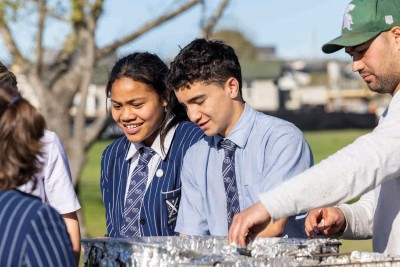
You are logged in as
Logout
You are logged in as
Logout
Regulus // Issue 3 // November 2022

Teacher in Charge of Te Reo/Māori, Pete Westrupp (right), preparing a hangi with Hannah Papali'i Taimalelagi Malietoa (Year 9) and Nikao Panapa (Year 10).
Rector, Christine Leighton, says the College has reached an important phase of deeper understanding of Mana ōrite mō te mātauranga Māori – equal status for Mātauraunga Māori within education for all ākonga (students). “As educators we have an urgent collective responsibility to ensure our students are well prepared and able to participate fully in their future in this changing world. To this end, I have been working on a Draft Māori Education Strategy, with Jamie-Lee Tuuta (OC 2005) who was appointed to the Board of Governors as an intern in 2021, and is a lawyer in various roles within iwi, the community, public sector, and private practice.”
The new draft strategy focuses on key principles including whanaungatanga (respect, foster and maintain important relationships), manaakitanga (respect to each other, guests, iwi and all others), and kaitiakitanga (protecting the people, environment, knowledge, culture, language and resources important to St Andrew’s College).
Christine says, once adopted, the Māori Education Strategy will sit alongside the College’s founding documents from 1917, in the Presbyterian Christian tradition, on which the College’s proud connections with its Scottish heritage are based. “Our narrative will honour our past as a school while recognising the part we play in shaping the future of all our students as citizens of Aotearoa.”
Māori students at St Andrew’s are doing very well academically, says Christine. “We are pleased with our Māori students’ achievements with some receiving regional and national recognition recently. Another measure of their success is feeling confident in this environment to be who they are and to celebrate their culture.”
St Andrew’s commitment to introductory Te Reo Māori and tikanga has been evident for many years through the one hour timetabled each week for all Year 9 ākonga, and similar programmes run by teacher Mary Leota in the Preparatory School.
In 2019, Pete Westrupp was employed as the Teacher in Charge of Te Reo/ Te Reo Māori, when St Andrew’s offered Te Reo as an option subject for Year 9 students for the first time. Since then, the programme has gone from strength to strength, and in 2023, will be available right up to Year 13, he says. “We are excited by the growth in the programme. This year we have 45 students across all year levels, and expect numbers to reach around 75–80 in 2023. We will start to see students graduating with Level 3 Te Reo Māori.”
Pete, along with Matua Steve Reid, and other teachers in the College are instrumental in providing a variety of important cultural experiences for students including the thriving Māori and Pasifika Group, which has been joined by a number of Pakeha students. “Students across the College are engaging with the culture and getting stuck into major projects in tikanga,” says Pete.
Christine says after huge growth, particularly in the Te Reo and tikanga space over the last five years, the formalisation of a Māori Education Strategy at a governance level is a big step forward. “We’ve learnt a lot and our students are doing some great things in this space. We understand there is still much to learn and are excited by the opportunities ahead.”